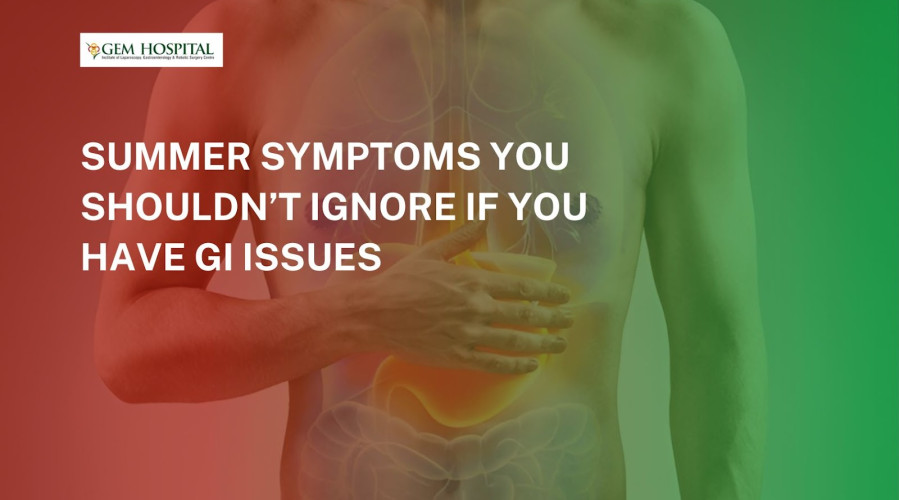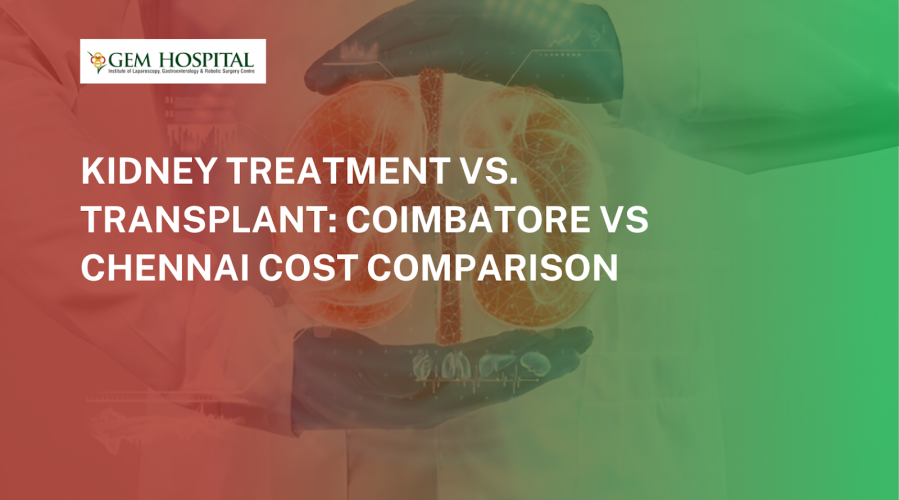Discover the latest advances in liver and kidney treatment at GEM Hospitals in Chennai and Coimbatore. Learn how our cutting-edge care and expert specialists set us apart from other healthcare providers.
Summer Symptoms You Shouldn’t Ignore if You Have GI Issues

Then you think of summer and those themes tend to pop up – sun, cold drinks, not-so-heavy meals. But for people with gastrointestinal (GI) disorders, this time of year is anything but fun. Digestive issues can actually get worse due to the rise in temperature, in altered food habits and the risk of dehydration. Lucky for us, we do have a heads-up: those of us who already have chronic gastric issues such as ulcers, acid reflux or irritable bowel syndrome should be on the lookout for heat-related upset-stomach issues that could grow into something serious.
1. Frequent Bloating and Indigestion
Dehydration is inevitable in hot weather, and when your body is not adequately humidified, it can’t digest either. These can lead to bloating, gas and indigestion. GI-sensitive individuals may also drink more cold liquid or eat more spicy street-side food during the sweltering season, which could induce heat-related stomach problems. If you find that you’re getting more distended or that you’re feeling inordinately full even when eating appropriate portions, don’t write it off as a seasonal issue.
2. Persistent Nausea or Vomiting
Too much heat also elevates body temperature, and is often responded to by the digestive system being slowed or discomfort felt. Nausea that won’t subside, or if you keep vomiting during the day, isn’t something to ignore due to excessive loss of fluid which could worsen any exisiting heat related gut issues in those with poor gut health in the first place.
3. Diarrhea or Loose Motions
In the summer there are a ton of infections that come from contaminated food or water. For people with GI conditions even mild infections can cause flare-ups. And as it happens, diarrhea is your body’s attempt to purge itself of poisons, but hint: It’s very hard on your electrolyte balance. Summer diarrhea can exacerbate your condition if you have a history of irritable bowel syndrome (IBS) or Crohn’s disease, and serve as a red flag for an underlying problem such as heat-related stomach issues that need attention from a doctor.
4. Unexplained Abdominal Cramps
can indicate an inflammation of the intestines. This symptom tends to be more prevelant during heat waves, as high temperatures can irrutate your GI system. People even with ulcers or gastritis tell me they are more uncomfortable in the summertime. If you’ve been getting cramps, even after just eating very bland food, it may be worth examining whether heat-related stomach issues are a factor.
5. Appetite Loss and Fatigue
But in people with GI conditions, appetite loss can rapidly result in undernourishment and fatigue. On the contrary, if you're eating less, dropping pounds and experiencing constant fatigue even with hydration and rest, these could all be signs of an internal heat-related stomach issues that impacts metabolism and digestion.
Take Action Before It Escalates
Ignoring these summer symptoms can delay timely treatment and worsen your existing GI condition. During this season, it’s crucial to keep yourself hydrated, eat home-cooked food and avert sudden dietary changes. But more crucially, don’t self-diagnose or treat persistent symptoms with home remedies.
At Gem Hospital , we are dedicated to providing treatment that is set up for each patient, specifically in the field of Gastroenterology. Heat-related stomach issues can be prevented from developing into chronic conditions through early detection and treatment. If you or someone you love is suffering the summer burn, now is the time to act early.
Book an appointment today and take the first step toward better digestive health this summer.
Blogs & Article
Find the best liver transplant centre near you with our comprehensive guide for patients in Chennai and Coimbatore. Learn how to choose a reliable centre for safe and effective treatment.
Compare the cost-effectiveness of kidney treatment versus transplant in Coimbatore and Chennai. Learn which city offers better options for kidney care and transplantation.


